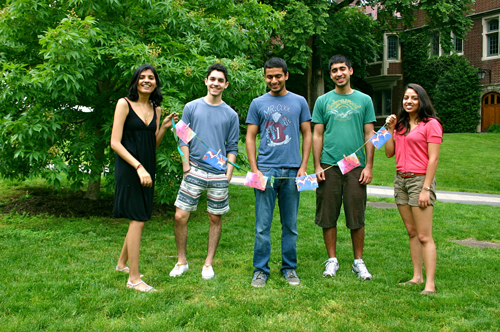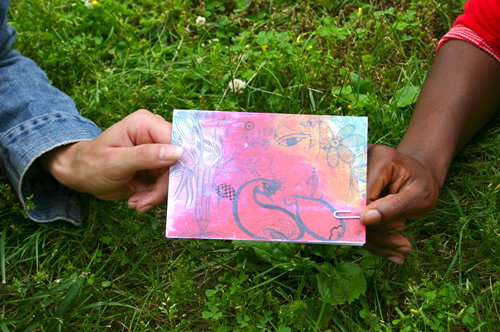
It is difficult to believe that we started a company -- let alone a social enterprise -- as undergraduates. Our venture, My Card My Story, would never have become a reality without the exposure and resources that college life has offered us.
Our journey began in Fall 2010, in a course at Princeton University, "Ventures to Address Global Challenges." John Danner, a visiting professor, began the first class by pinning a large sheet of paper on the board. He drew two axes, one representing social activism and the other representing entrepreneurship, asking us to self-identify in different quadrants. The points the four of us -- Nikhil, Sankalp, Fatema, and Sanchali -- plotted at the beginning of Danner's class were scattered across the grid.
Yet we became a team when our class was assigned to present a business idea in a five-minute YouTube video. We had a variety of skill-sets, interests and experiences, ranging from the Silicon Valley tech scene to microfinance programs in Tanzania. But we realized that we shared a common passion in our mutual Indian heritage and the desire to address the vast challenges that exist in India. Armed with an abstract concept, a handmade greeting card prototype, and an excess of enthusiasm, we 'pitched' the idea to classmates, retail workers, browsers at the local bookstore, and unsuspecting customers in frozen yogurt shops. As we heard ourselves and each other pitch the idea as our own, it grew from an assignment to a dream.
Working on My Card My Story (MCMS) on campus had a way of pushing open doors we had never even imagined. Danner encouraged us to apply to Princeton's business competition, TigerLaunch. With a few tweaks, we submitted our final project. After a whirlwind day of pitching to investors and judges, we came in second place in the Social Track, securing $2,000 in seed capital. It was the vote of confidence we needed to take our business model from paper to product.
As college students we were old enough to design something sensible yet young enough to dream big. We hunched over laptops with shared Google Docs and worked late into the night on business plans and website designs, relegating assignments, exams, and thesis chapters to the early morning. We attended public lectures with entrepreneurial speakers and waited by the door to ambush the panelists for help and advice. Conversations with friends, family, and strangers turned into "Do you know anybody who..." brainstorming sessions. Every time a spontaneous conversation yielded a new contact or a potential order of cards for their company, we shot off enthusiastic emails to each other.
When one of us was swamped with work, the others stepped up. There was no mention of scorekeeping, just tacit mutual understanding of a shared dedication to the goal we had all adopted. It was not an easy leap of faith to trust a new team with such an enormous undertaking. But we learned for ourselves the truth in Harry Truman's famous words: "It is amazing what you can accomplish if you do not care who gets the credit."

Fast forward one year: we are incorporated as My Card My Story LLC; the four founding team members have graduated (despite sleepless nights typing business plans); and we have expanded our team to include three new undergraduates to continue our presence on campus, including our partnership with the Princeton University Store. We have forged a partnership with The Akanksha Foundation, a highly respected NGO in Mumbai, and have transformed paintings by underprivileged children with big dreams into beautiful greeting cards. We are now selling a line of cards optimistically dubbed "debut collection" in local stores and on our website, www.mycardmystory.com. The proceeds from the sales go back to sponsoring the children's education, presenting them the opportunity to become active stakeholders in their futures. In the process, we hope to forge cross-cultural relationships, enabling the young artists to share their voices with individuals around the world.

The topography of international aid is changing, moving away from the dominance of bilateral and multilateral organizations toward a new landscape of individual engagement. There is no longer a single philanthropic model. Over the last decade, the entrance of new players in the "market for giving" has awakened the forces of competition, creating the perfect environment to pursue unconventional entrepreneurship. Colleges across America are encouraging students to pursue social entrepreneurship, hosting social business competitions, conferences, and courses, creating new spaces for young people to engage with social challenges. As young adults in college, we bring fresh outlook and innovative ideas to solve age-old problems.
Check us out at www.mycardmystory.com -- if you like our mission, buy a card. If you're inspired by our story, start a company.